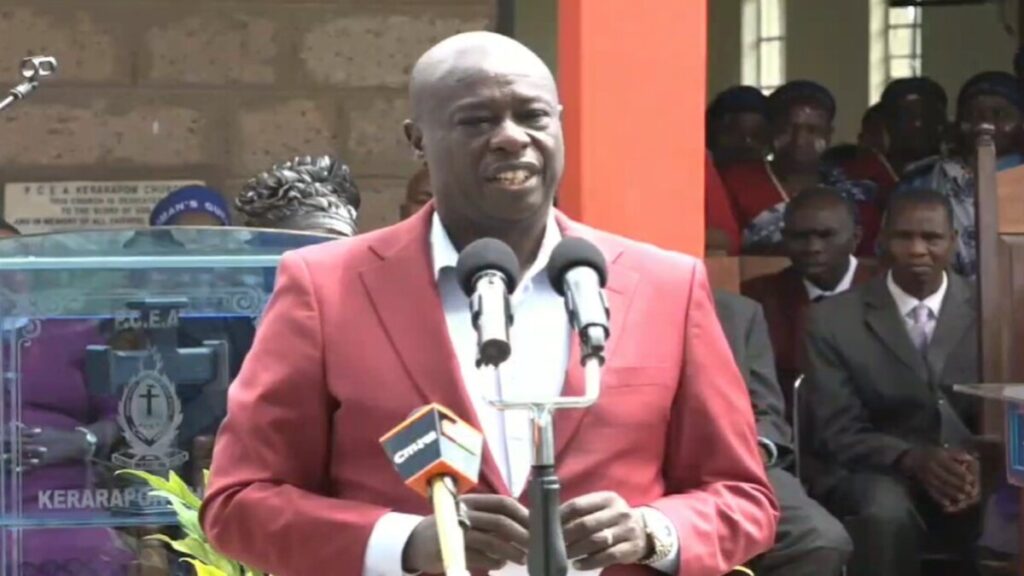Former Deputy President Rigathi Gachagua has strongly endorsed the Catholic bishops’ recent criticism of President William Ruto’s administration.
In a bold move that has sparked intense political debate, Gachagua defended the Kenya Conference of Catholic Bishops’ right to speak truth to power.

Former Deputy President Rigathi Gachagua speaking on Sunday, November 17, 2024, during the celebration of 100 years of mission work at PCEA Kerarapon Church, in Kajiado North Constituency, Kajiado County. courtesy photo
“The voice of the church is the voice of God,” Gachagua declared during a public address. “When our spiritual fathers speak, they don’t just speak in vain.”
The former Deputy President expressed deep disappointment with Members of Parliament who had attacked the bishops’ statement.
He specifically criticised National Assembly Deputy Speaker Gladys Boss Shollei for what he termed as “lecturing Catholic bishops like children.”
Gachagua’s remarks come after the bishops issued a strongly-worded statement criticising the current administration’s performance.
The Catholic leaders had raised concerns about various issues affecting Kenyans under the current government.
Their statement highlighted problems including increased taxation, economic hardships, and alleged human rights violations.
The bishops also accused the government of perpetuating a “culture of lies” and failing to fulfil campaign promises.
They pointed out serious shortcomings in crucial sectors such as health, education, and security.
Gachagua warned government officials who have become dismissive of criticism due to their positions of power.
“Let’s be humble. Let’s allow our spiritual leaders to chastise us in love,” he urged fellow politicians.
The former Deputy President drew parallels between the current government’s response and tactics used during former President Moi’s regime.
He cautioned that such approaches could have serious consequences for the administration.
His support for the bishops marks a significant departure from the government’s official stance on the matter.
Several pro-government MPs had earlier criticised the bishops’ statement, leading to heated public debate.
Gachagua emphasised the importance of respecting religious leaders and their role in society.
“I don’t think over 30 bishops can meet and do a statement from nowhere,” he stated, defending the legitimacy of their concerns.
The former Deputy President’s intervention has added weight to the bishops’ criticism of the government.
Their statement had highlighted various economic challenges facing ordinary Kenyans.
The bishops specifically mentioned the burden of excessive taxation on citizens.
They also expressed concern about what they described as the suppression of dissent.
Reports of abductions and human rights violations were among the issues raised by the religious leaders.
Gachagua’s support has brought renewed attention to these serious allegations.
His stance has created apparent tension between him and some government officials.
The former Deputy President urged political leaders to remain humble and accepting of criticism.
He emphasised that church leaders deserve respect as “the anointed men and women of God.”
His comments have sparked discussions about the relationship between church and state.
Many observers view this as a significant moment in Kenya’s political landscape.
The bishops’ criticism and Gachagua’s subsequent support have highlighted growing concerns about governance.
Political analysts suggest this could signal deeper divisions within the ruling coalition.
The former Deputy President’s comments have resonated with many Kenyans facing economic hardships.
His support for the bishops has added credibility to their concerns about government performance.
The situation continues to develop as more political figures weigh in on the controversy.
This debate has brought attention to the role of religious leaders in political discourse.
It has also highlighted the importance of constructive criticism in democratic governance.